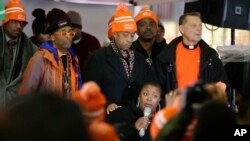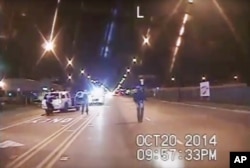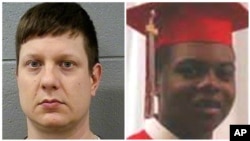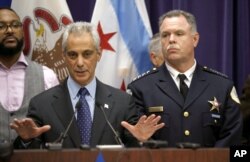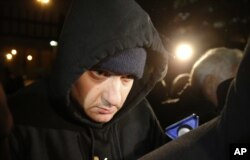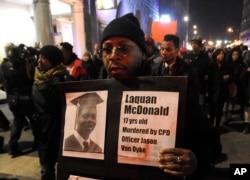Several questions remain unanswered in a fatal Chicago police shooting case, a day after Mayor Rahm Emanuel fired the city's police superintendent.
Chicago, the third-largest city in the U.S., has been the site of several protests since police Officer Jason Van Dyke, who is white, was charged November 24 with first-degree murder in the October 2014 killing of black teenager Laquan McDonald.
Video from a squad-car dashboard camera, released last week, shows Van Dyke shooting McDonald 16 times in the middle of a street on October 20, 2014. Van Dyke, 37, continued firing at McDonald even after the 17-year-old had crumpled to the ground. Van Dyke's lawyer said he feared for his life before opening fire.
However, the video footage contradicts initial accounts police officials gave in 2014.
At the time, police said McDonald lunged at officers before shooting began, and a police statement just after the shooting said McDonald had refused to drop a knife and "continued to approach the officers."
Initial media reports based on police information also suggested McDonald was killed by a single shot to the chest.
Police account vs. video
However, the video shows McDonald walking down the middle of a four-lane street, and then appearing to veer away from police as Van Dyke opens fire.
The video shows something in McDonald's hand; a knife was found at the scene, with its blade folded into the handle.
Late Tuesday, Dean Angelo Sr., president of the Fraternal Order of Police Chicago Lodge 7, agreed McDonald did not appear to "lunge" at Van Dyke. But he added that McDonald did slightly "square his shoulders" toward Van Dyke, and said the police officer may have perceived that as a threat.
Van Dyke is not visible in the police video. He apparently was standing at least several meters away from McDonald when he shot the teenager.
Neither is it clear whether McDonald was walking toward the police at that moment, but from his reaction when hit by the gunfire -- he shuddered, turned slightly and fell to the ground -- it appeared he was not walking directly at the police.
Questions also are being raised about the lack of any sound on the police dashcam video. There also was no audio on any other videos taken from other police cruisers at the scene and subsequently released. Typically, police videos record sound as well as images.
Sound often gives insight to what's happening and why an officer or suspect acted the way they did, Ed Primeau, a Michigan-based audio and video forensics expert, told The Associated Press.
Chicago police spokesman Anthony Guglielmi suggested the absence of audio on the recording from Van Dyke's camera was most likely a technological glitch. However, he said it is hard to believe no audio was available on any of the police videos.
"It's a red flag," Guglielmi said. "I see it all the time -- not just by police, but by people trying to cover things up."
Activists accuse the city and police department officials of dragging their feet on the investigation and waiting over a year to release the video, and possibly even seeking to cover up what happened.
Federal probes
On Tuesday, Illinois Attorney General Lisa Madigan called on the U.S. Department of Justice's civil rights division to investigate Chicago police practices, including use of deadly force and the adequacy of its investigation of misconduct allegations.
The Justice Department could investigate the police force, as it did in Ferguson, Missouri, and Baltimore following deaths involving officers and unarmed black men in those cities.
The U.S. Attorney's Office said it has had an open criminal investigation into the shooting since April, which raises the possibility the federal officials are looking into authorities' handling of the incident beyond the initial shooting.
Mayor Emanuel announced Tuesday that he had asked Garry McCarthy, police superintendent since May 2011, to resign.
Emanuel also said he was creating a new police accountability task force to be advised by former Massachusetts Governor and Chicago native Deval Patrick.
The panel is due to provide recommendations by March 31 on how to boost independent oversight of police misconduct. The mayor said the task force also should ensure officers with repeated complaints are evaluated, and he called for releasing videos of police incidents in a more timely manner.
Emanuel formerly was chief of staff at the White House for President Obama, who calls Chicago his hometown.
Bail was set at $1.5 million for Van Dyke on Monday, and he was released the same day after posting a bond for 10 percent of the sum, $150,000, under normal procedures. Police union members helped Van Dyke's family raise money for the bond.
Similar shooting case
In another incident, a lawyer representing the family of a 25-year-old man killed by Chicago police on October 12, 2014, told reporters a dashboard camera video of the shooting that would challenge the police version of events could be released by court order as early as December 10.
Ronald Johnson III was running from police when Officer George Hernandez arrived and seconds later shot him in the back, lawyer Michael Oppenheimer said. Police said Johnson had a gun and turned toward officers before being shot.
The city's Law Department told the Chicago Tribune Tuesday that the city was "currently re-examining" when the video of Johnson's shooting should be released.
The incident is under investigation by the Independent Police Review Authority, which looks into allegations of police misconduct, and a spokeswoman for the state prosecutor told the newspaper that criminal charges against Hernandez are being considered.
The Johnson case occurred just eight days before McDonald's killing in 2014.
Several days of largely peaceful protests have been held in Chicago since the release last week of the shooting video.
Tuesday night, about 150 demonstrators endured nearly freezing temperatures to rally outside Chicago police headquarters in a protest led by the city's chapter of the Black Lives Matter group.
In New York City, Spike Lee, who was at the premiere of his new movie Chi-Raq, predicted "some more heads are gonna roll" in the Chicago shooting and video fallout. The police superintendent "is not going to be the only one," he said Tuesday night.
After the premiere, Lee and several cast members participated in an anti-gun violence march in New York.
The movie, a modern adaptation of the ancient Greek play Lysistrata, is about the murder of a child hit by a stray bullet in Chicago's South Side, and the group of women that organize a unique way of dealing with the ongoing violence, by withholding sex.
Racial tensions nationwide
The Chicago case is the latest of several similar confrontations in U.S. cities in which white police officers have killed black suspects, many of whom have been unarmed, in the past two years. The killings have prompted demonstrations across the country, and have stoked a national debate on race relations and police tactics.
Police involved in several cases were investigated and cleared of criminal wrongdoing, but in other instances officers have faced criminal charges, up to and including murder.
On Wednesday, a jury was selected in the trial of the first of six Baltimore, Maryland, police officers charged in connection with the death of a black man in police custody. That incident set off days of rioting earlier this year in the East Coast city and added to heightened racial tensions across the country.
Some material for this report came from AP and Reuters.




